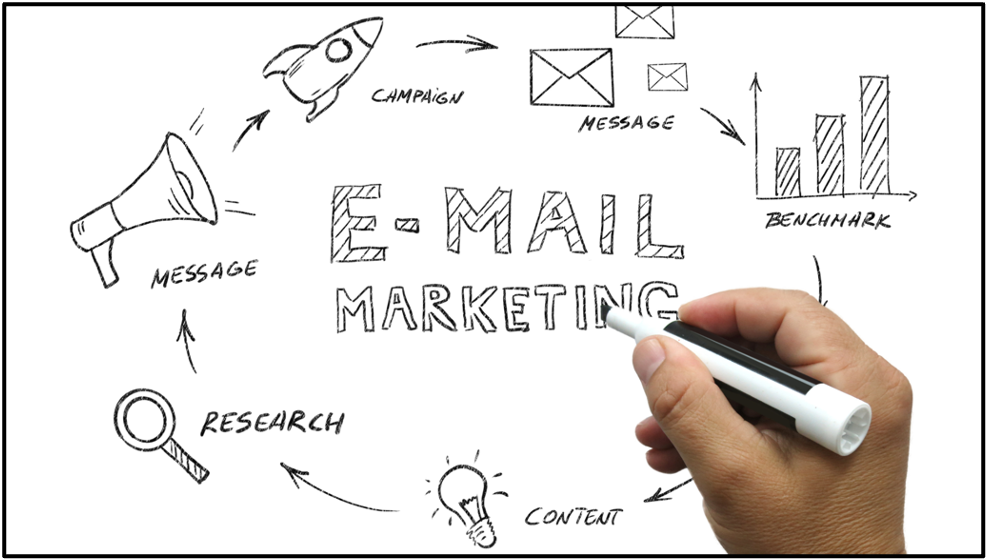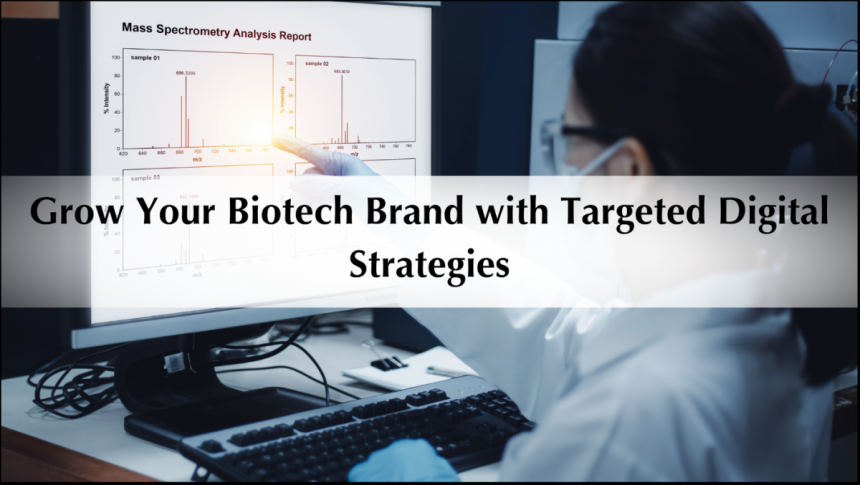As biotechnology continues to transform healthcare and scientific discovery, your innovative research and groundbreaking products merit widespread recognition. However, effectively promoting a biotech brand online while complying with industry regulations presents unique challenges.
This guide addresses the key challenges in digital marketing for biotech, providing strategies to effectively showcase your brand, connect with crucial stakeholders, and stand out in a competitive industry.
Whether you’re a nascent startup aiming to attract investors or an established firm seeking to expand your market footprint, these targeted digital approaches will empower you to elevate your biotech brand and create a significant industry impact.
Biotech Marketing
Biotech companies operate in a highly specialized field, dealing with complex scientific concepts and innovations. This complexity can make effective communication challenging with diverse audiences, including investors, regulators, healthcare professionals, and the public. The industry’s strict regulations also impact marketing efforts, adding an extra layer of complexity to biotech marketing.
Successful biotech marketing requires targeting multiple stakeholder groups: investors, regulatory bodies, healthcare professionals, patients, potential partners, and the media. Each group has unique needs and interests, necessitating a multifaceted approach to digital marketing.
To deal with these complexities, biotech marketing solutions offer tailored strategies, ensuring that communication is clear, compliant, and compelling across all channels. These solutions often include specialized content creation, targeted advertising campaigns, SEO optimization for scientific keywords, regulatory compliance consulting, and robust analytics to measure and refine marketing efforts.
By leveraging these solutions, biotech companies can effectively reach their diverse audience and achieve their marketing goals.
Developing a Strong Online Presence
Your website is often the first point of contact for potential stakeholders. Design a clean, modern interface that’s easy to navigate and responsive across devices. Communicate your company’s mission, values, and unique selling propositions. Provide detailed information about your research, products, and pipeline.
Include a robust “About Us” section and implement strong calls to action for investor relations, partnerships, and career opportunities. Improve your website’s visibility in search engine results by conducting keyword research focusing on life science marketing companies.
Optimize on-page elements, create high-quality content, and build authoritative backlinks. Ensure your website is technically sound, with fast loading times and mobile-friendliness. Focus on professional networks for B2B connections and recruitment.
Use social media platforms to share industry news and company updates. They can also be used for visual storytelling. Maintain consistent branding across platforms and engage regularly with followers and industry influencers.
Content Marketing for Biotech Brands
Developing a Content Strategy
Create a comprehensive content plan addressing the needs of various stakeholder groups. Define clear goals, identify key topics, and create a content calendar to ensure consistent publication. Determine appropriate content formats for each audience segment.
Types of Content for Biotech Companies
Diversify your content to cater to different preferences:
- Blog posts and articles explaining complex concepts
- White papers and case studies showcasing research
- Infographics and data visualizations
- Video content, including expert interviews and product demonstrations
- Podcasts featuring industry discussions
- Webinars and virtual events
Thought Leadership and Expert Positioning
Position your company and executives as industry leaders by authoring articles for reputable publications, seeking speaking opportunities, and participating in industry panels. Collaborate with academic institutions or other biotech companies on joint research projects.
Email Marketing and Lead Nurturing
Offer valuable content in exchange for email sign-ups. Segment your list based on stakeholder type, interests, and engagement level. Implement double opt-in to ensure list quality and compliance with regulations.
Develop email content that provides value and drives engagement. Create a mix of promotional and informational content. Personalize emails, use compelling subject lines, and include clear CTAs. Optimize emails for mobile devices.
Implement automated email sequences to guide leads through the funnel, including welcome series, educational content, investor-focused updates, and re-engagement campaigns.

Paid Advertising and Targeted Outreach
Leverage your professional network for targeted advertising. Use Sponsored Content, InMail campaigns, and detailed targeting options to reach specific job titles, industries, and companies.
Develop search campaigns targeting industry-specific keywords. Focus on keywords relevant to a B2B marketing agency to attract business clients seeking specialized marketing services. Use display ads for brand awareness and implement remarketing campaigns to keep your brand in front of potential customers who have shown interest in your products or services.
Explore advertising opportunities on biotech-specific platforms, including news websites, online forums, and digital versions of industry journals. Targeting keywords pertinent to a B2B digital marketing agency allows you to reach companies seeking comprehensive digital marketing strategies. Explore advertising opportunities on biotech-specific platforms, including news websites, online forums, and digital versions of industry journals.
Leveraging Data and Analytics
Implementing Tracking and Analytics Tools
Set up comprehensive tracking to monitor your digital performance. Use tools like Google Analytics, social media analytics, and heat mapping to gain insights into user behavior and marketing performance.
Key Performance Indicators (KPIs) for Biotech Marketing
Identify and track relevant KPIs, including website traffic, lead generation rates, email engagement, social media growth, and ROI for paid campaigns. Regularly monitor these metrics to assess the effectiveness of your marketing efforts.
Continuous Optimization and A/B Testing
Use data to refine your digital strategies. Conduct A/B tests on website elements, email campaigns, and ad copy. Analyze user behavior and adjust strategies based on performance metrics.
Building Trust and Credibility
Foster trust through open and honest communication. Regularly update stakeholders on research progress, clearly explain potential risks, and address industry challenges proactively. Provide easy access to financial reports and regulatory filings.
Highlight your company’s industry connections. Feature testimonials and case studies from reputable partners. Announce strategic collaborations and showcase grants, awards, or recognitions received.
Demonstrate your commitment to ethical practices by clearly communicating your stance on important biotech issues. Highlight initiatives promoting responsible research and development. Engage in industry discussions about ethics and regulations.
Staying Ahead of Digital Trends
Consider how new technologies can enhance your digital presence, such as virtual reality for product demonstrations, AI for personalized content recommendations, or blockchain for enhancing transparency in clinical trials.
Stay agile and ready to adapt to platform changes. Monitor updates to social media algorithms and search engine ranking factors. Explore new features and ad formats on existing platforms.
As third-party cookies phase out, focus on building first-party data through email subscriptions and gated content. Explore contextual advertising options and invest in developing strong brand recognition.
| Aspect | Traditional Marketing | Digital Marketing |
| Reach | Limited to local or industry-specific audiences | Global reach with targeted capabilities |
| Cost | Often high (print ads, trade shows, etc.) | More cost-effective with flexible budgets |
| Measurability | Limited, often based on estimates | Highly measurable with detailed analytics |
| Targeting | Broad audience targeting | Precise targeting based on demographics, behavior, etc. |
| Engagement | One-way communication | Interactive, two-way communication |
| Adaptability | Slow to change, long lead times | Quickly adaptable, real-time adjustments are possible |
| Content Depth | Limited by space/time constraints | Unlimited potential for in-depth content |
Conclusion
To grow your biotech brand online, use a mix of different digital marketing methods. Focus on creating a strong website, sharing useful content, and using social media wisely. Keep in touch with your audience through email and targeted ads.
Always measure your results and make improvements. Build trust by being open and ethical. Stay up-to-date with new digital tools and trends. By using these strategies, your biotech company can become more visible, connect with important people, and succeed in a competitive industry.
Frequently Asked Questions
- How can we measure the ROI of our digital marketing efforts in biotech?
Track KPIs such as website traffic, lead generation, engagement rates, and conversion metrics to assess ROI.
- Is it worth investing in paid advertising for a biotech startup?
Yes, targeted paid advertising can significantly boost visibility and lead generation, especially when organic reach is limited.
- How can we simplify complex biotech concepts for a general audience?
Use analogies, infographics, and explainer videos to break down complex ideas into more digestible content.
Lynn Martelli is an editor at Readability. She received her MFA in Creative Writing from Antioch University and has worked as an editor for over 10 years. Lynn has edited a wide variety of books, including fiction, non-fiction, memoirs, and more. In her free time, Lynn enjoys reading, writing, and spending time with her family and friends.















